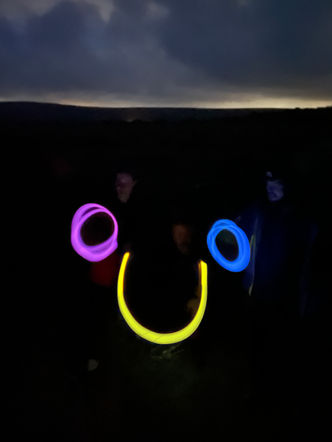
Year 1 -
Clean Planet Peninsula
UK Field Experience
After a successful pilot year in 2023 as featured on the BBC, the Clean Planet Peninsula project embarked on an ambitious and visionary multi-year journey.
Building on the pilot's success, the Clean Planet Foundation invited 20 participants to join an immersive training course in August 2024 in the UK.
In 2025 and 2026, selected participants from this training group will travel with the project to the Arctic and Antarctic to undertake scientific research and further training.
The year-1 (2024) training on Dartmoor provided selected participants with a realistic and challenging environment that simulated conditions they will face in the Arctic and Antarctic (all be it a little warmer). The participants, a diverse group of early-career scientists selected from across the UK, endured heavy rain, low visibility, and strong winds—conditions that tested their endurance, teamwork, and expedition skills.
Meet the Y1 Participants
Meet the incredible 20 participants of the #CleanPlanetPeninsula project!
Passionate researchers and environmental advocates from across the UK who joined us on this groundbreaking journey in 2024. Together, we will explore the pristine Polar regions and uncover the impact of microplastics on our planet's most remote environments. ❄️🌊
This is just the beginning of a multi-year expedition aimed at advancing scientific understanding and raising awareness about the crucial issue of microplastics and their effects on human health and the environment. 🌱💧

Meet the Participants - Y1 2024 - Clean Planet Peninsula
The project enhanced the diversity of the UK’s scientific and polar community;
-
65% of the group were female.
-
Participants ranged in age from 18 to their early 40s contributing to a broad spectrum of perspectives and experiences.
-
Attended ten different academic institutions across the UK.
-
Represented eight ethnic backgrounds.
-
The participants also came from the length and breadth of the UK; from Glasgow to Dover, and County Durham to Plymouth- further enriching the project with a wide array of local insights.
-
Notably, 70% of the participants have a study focus or enhanced interest in microplastics, underscoring the project’s commitment to tackling this critical environmental issue.

Project Scientific Advisor
Dr. Winnie Courtene-Jones giving a guest lecturer to the group
Year 1 - Review

Dartmoor Search and Rescue - Plymouth provided hands on training during the course.
The week-long course was packed with both theoretical and practical sessions. Participants learned crucial skills ranging from advanced navigation techniques to search and rescue operations, which were conducted in partnership with the Dartmoor Search and Rescue Team.
These sessions were not just about survival but about leadership and teamwork—core elements that are vital for success in the remote and harsh environments they will soon encounter.
The training also included an introduction to scientific fieldwork techniques, with a focus on microplastics research—a central theme of the Clean Planet Peninsula Project.
Although this initial phase did not involve the formal collection of research data, participants practised the methods they will use in the Arctic and Antarctic to collect samples.
This hands-on experience is designed to ensure that when these early-career scientists embark on their polar expeditions, they will be fully equipped to contribute valuable data to the global scientific community.

"The skills and knowledge gained during this training are crucial for the upcoming expeditions to the Arctic and Antarctic...
...We are committed to ensuring that our participants are not only prepared for the physical challenges but also equipped with the rigorous scientific methods necessary to conduct high-quality research."
Prof. Fay Couceiro, the scientific leader of the project from the University of Portsmouth.

Looking Ahead
As the Clean Planet Peninsula Project moves into its second year, the focus will shift to applying the skills learned in Dartmoor to the Arctic.
Selected participants from Year 1 will have the opportunity to travel to the Arctic, where they will conduct groundbreaking research on microplastic pollution and its effects on polar ecosystems.

Clean Planet Foundation
Organiser & Lead Sponsor
The Clean Planet Foundation (CPF) educates and takes action for the sustainable use of plastics, and reduction of carbon emissions. A not-for-profit organisation.
We believe that everyone deserves better, and provide community funding, sponsorship, investments and initiate flagship projects to mitigate the impact of the plastic and climate crises across the UK and beyond.
The Clean Planet Foundation is part of the Clean Planet Group which also builds technologies and infrastructure to remove hard-to-recycle plastic waste from the environment, and convert it into circular products.


Year 1 (2024) Gallery



.png)
































